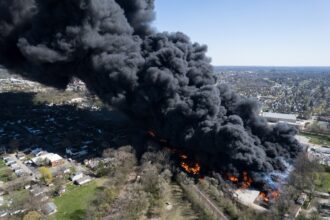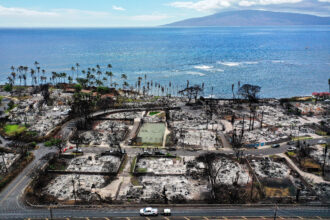This story was originally published by The 19th.
On an otherwise normal Friday night this past February, Misti Allison received a text from her sister-in-law that a train had derailed not far from Allison’s house in East Palestine, Ohio. She didn’t think much of it, other than concern for those who might be injured. There had been incidents with the trains that run through town before, usually accidents with cars attempting to cross the tracks.
As Allison tucked her kids into bed, she could hear sirens wailing. Her husband went out to investigate and sent a picture of what he saw from the bottom of their driveway. In the direction of the train tracks, just past the high school football bleachers, a stand of trees was backlit by a large fire that sent billowing clouds of smoke into the night sky. Their house was just over a mile from the derailment.
“It just felt like you were in an apocalyptic movie,” Allison said.
The next morning, Allison smelled something peculiar when she got up to take their family dog outside.
“It was more sweet or like more chemical in nature,” she said. “That’s when we started to get worried, because no one had discussed yet about what was on the train.”
Soon, details began to emerge. According to the Environmental Protection Agency (EPA), dozens of cars containing toxic chemicals like vinyl chloride, ethylene glycol, ethylhexyl acrylate, butyl acrylate and isobutylene derailed. Some of the chemicals ended up contaminating nearby streams, killing thousands of fish. Other chemicals ignited into flames that wouldn’t go out. The local fire department decided to conduct a controlled burn of the remaining chemicals days after the incident—fearful that if they didn’t it could lead to a larger explosion, further endangering residents.

In the months since the train derailment, Allison—who works as a product marketer—has been outspoken about the disaster. She has appeared on Fox, CNN and other news networks to relay the concerns of her community and keep the fate of East Palestine in the news and on the minds of government agencies.
“When authorities conducted a controlled burn, it was like a bomb went off, a bomb containing vinyl chloride, which releases dangerous chemicals … such as dioxins, which are not safe at any level and cause damage that may not show up for years,” Allison told a Senate committee hearing a month after the derailment. “Two days later, our government told us it was safe to come home. But is it safe? People and animals in my community are sick. The EPA tells us the data is fine, while independent researchers say that there are high levels of carcinogens all around us. Who do we trust?”
Allison now views the derailment as a pivotal moment in her life that launched her activism. Prior to the incident, she hadn’t thought about the trains that careened through town and whether there were strong regulations in place to protect her community. She hadn’t been involved politically.
But as the incident has fallen out of the news cycle, she fears that the long-term needs of East Palestine residents could be forgotten. So she’s decided to do something about it: run for mayor.
One night not long after the derailment, Allison’s 7-year-old son asked her if he was going to die. On another occasion, on the way home from school, he asked her if there was vinyl chloride in the puddle he had just jumped in.
“As a mom, hearing something like that is absolutely heartbreaking,” she said. “Because you know, mothers will stop at nothing to protect their children. I’m very concerned about our whole community, but especially for the children in town.”
It is one reason why she ran for mayor of East Palestine. She wants to assuage the fears of her son, but she also wants to know whether there could be long-term impacts from the toxic chemicals spilled. Right now, she can’t totally assure his safety.
In East Palestine, the mayor is a spokesperson for the village, responsible for leading the town and communicating with residents, something Allison said is crucial at this time. It’s partially why she’s running, to bring more transparency to how the town is handling long-term economic and health issues associated with the derailment. The race was nonpartisan, though both Allison and incumbent Trent Conaway are Republicans.
Allison is following in the tradition of women before her who have been galvanized to take action when an environmental health disaster threatens their towns and families.
Phil Brown, a professor of sociology and health sciences at Northeastern University who has written books on toxic waste activism, said women, and mothers in particular, have consistently organized locally after incidents like the Ohio train derailment.
In Woburn, Massachusetts, where a leukemia cluster was linked to an industrial chemical spill in the Aberjona River in the late 1970s, it was mothers who were talking at the pediatric oncology center south of Boston, connecting the dots between their children’s leukemia and contaminated water wells, he said.

Around the same time, housewife Lois Gibbs was investigating the root cause of mysterious illnesses that had been popping up in her community, including in her own children. She discovered that her neighborhood was situated atop over 21,000 tons of buried chemical waste. Gibbs, who went on to found the Center for Health, Environment and Justice, is credited with helping lead the creation of the EPAs Superfund Program, which focused on cleaning up contaminated sites around the country.
Women of color were simultaneously organizing in the South and Southwest to stop industry pollution in their neighborhoods in places like Louisiana’s Cancer Alley, where petrochemical facilities proliferated, endangering the health of residents to this day.
In many of these cases, Brown said, women didn’t have any intention of becoming public figures.
“They often say this about themselves, ‘I was shy in public. I never took any positions on political issues.’ And all of a sudden they felt compelled to because it was so visible right in front of them,” he said.
Allison describes her ascent into the public eye after the disaster as a series of divine interventions. She did her first media hit after connecting with journalist Jenna Lee, formerly of Fox News, over Instagram to talk about her experience. That led to an appearance on Fox News, then the calls started coming.
First it was someone from the EPA, who invited Allison to a meeting attended by the head of the agency, Michael Regan, and Ohio Gov. Mike DeWine at her local church. Allison shared her concerns and those of other residents with the EPA and other federal officials, explaining the anxieties and fears circulating in the community about whether the chemicals released into the air and contamination of the soil could be dangerous to their health.
After that meeting another phone call came, this time from Moms Clean Air Force, an environmental advocacy group that focuses on protecting children from pollution. They wanted her to travel to Washington, D.C., to attend a U.S. Senate Committee on Environment and Public Works hearing.
“I was able to go, and then a couple of other East Palestine moms were there as well. And that’s when I first became familiar with Moms Clean Air Force,” she said. “I will be forever grateful for the connections that they have and really their mission, because I truly feel without that, people wouldn’t still be talking about East Palestine.”
In 2011, Dominique Browning started Moms Clean Air Force after noticing how many moms were talking about concerns over their children and babies being exposed to toxic chemicals in everyday products.
At the time, “mommy blogs were proliferating on the topic,” she said. “I was very interested in what everybody was writing about, which had to do mostly with toxic chemicals and chemicals in their stuff, especially in things like baby bottles and plastics.”

She wanted to empower moms and other caretakers to act on those concerns politically, by helping them connect with members of Congress and by coordinating visits to the Hill where they could express their concerns or advocate for policies. “Because it’s not really about buying things,” she said. “It’s about changing the system and passing the right laws.”
The organization now counts over 1.5 million members, many who are organizing locally and nationally on legislation and policies that are aimed at protecting the air, water and land from environmental degradation including chemical contamination, but also on more progressive issues like climate change.
“I feel very, very strongly that women have not been given opportunities, doors opened, invitations made to participate,” Browning said. “A lot of what was motivating me was to get women comfortable with the political process and open doors and show people how to open doors.”
Over the years, many women from Moms Clean Air Force, like Allison, have gone on to run for political office, been appointed by governors to serve on roundtables, or taken local representative roles, Browning said.
While the advocacy group could not as a nonpartisan organization endorse Allison in the race, Browning said she thinks it’s fantastic Allison ran for mayor.
“We need more women in political power and we need more people representing our values of protecting our communities and our families,” she said. “And, we need people who have an understanding of how toxic a lot of industry is and how unnecessarily risky things can be.”
Allison, who has a masters in public health and has previously worked at the Susan G. Komen for the Cure and the American Cancer Society, helped connect East Palestine to independent researchers, who are tracking residents’ health through different studies and measuring exposure to contaminants.
Allison herself has signed up for every study she can to contribute to research that could keep her children safe. She also serves as the chair of a community advisory board set up by Dr. Erin Haynes, a researcher from the University of Kentucky who studies environmental health issues in Appalachia and is planning to conduct a long-term health tracking study.
In the months since the incident, residents have complained of nosebleeds and headaches, as well as rashes. Others have experienced neurological symptoms like seizures. But without research, they can’t prove that chemicals from the train derailment are causing their symptoms.
During the pilot phase, Haynes monitored 80 residents, including Allison, doing blood and urine analysis on some participants and using wristbands that can track potentially hazardous chemicals in the air to determine what community members might still be exposed to in the aftermath. Results from the pilot have not yet been released.
But having this type of access to researchers hasn’t alway been the case in towns like East Palestine, Brown said. Back in Gibbs’ day, when women were trying to figure out what was causing different illnesses in their community, they would often have to conduct the scientific work themselves. There was a lot of resistance around listening to individuals in the community or considering their work valid. At the time most researchers were men. Women, when they spoke up, were painted as hysterical housewives.
Now, scientists are encouraged to take a more bottom-up approach that’s focused on community input.
“It is absolutely essential for environmental health researchers to work with and for community residents of impacted areas,” Haynes said. Having someone like Allison, who can be that connector, is important for ensuring studies are actually benefiting residents. The goal “is to help the community as much as possible to answer their questions about the impacts of the train derailment on their current health and future health,” Haynes said in an email.
If elected, Allison would continue doing a lot of the work she’s already taken on voluntarily — serving as a spokesperson for the village, but also communicating to residents about the various ongoing health studies and updates regarding the train derailment, something she does currently in a video segment on her Facebook page called “Mondays with Misti.”
But she emphasized that the role is about more than the train derailment. “You still need to have the streets being paved and make sure the hydrants are getting flushed,” she said. Her Monday segments touch on other subjects too, like where Halloween festivities will be held or the location of the next village meeting.
It’s a reminder that life continues to move on after tragedy. Still, Allison said the town is split between those who want the incident to be firmly in the town’s past and those still dealing with the fallout from the toxic contamination.
“Ten years from now I want to be able to say, ‘Yes, we went through a lot but we are able to build back stronger, and that yes, our community was fractured, but we are able to be reunited again,’” she said.
“That’s really the goal. It is such a nice community to raise your family and we love it here and we want to be able to stay here long term, but obviously only if it is safe.”
Update: Misti Allison lost her bid for the mayor of East Palestine to the incumbent in an election decided by fewer than 200 votes.











